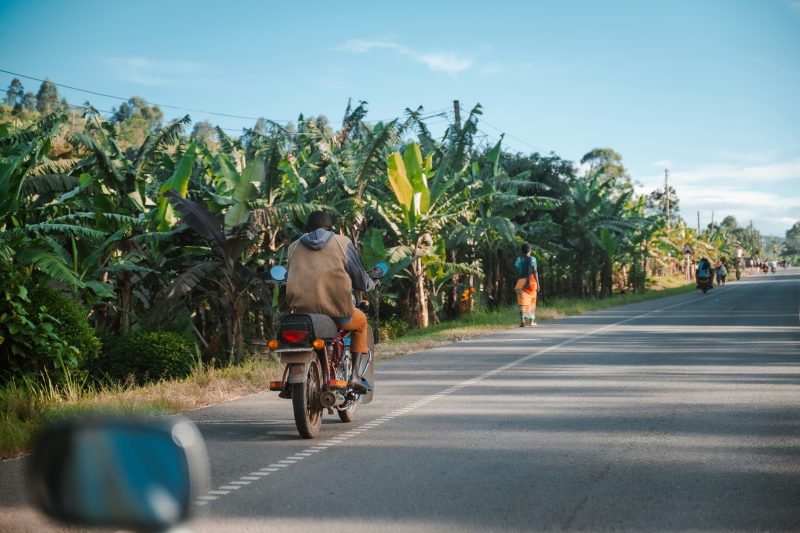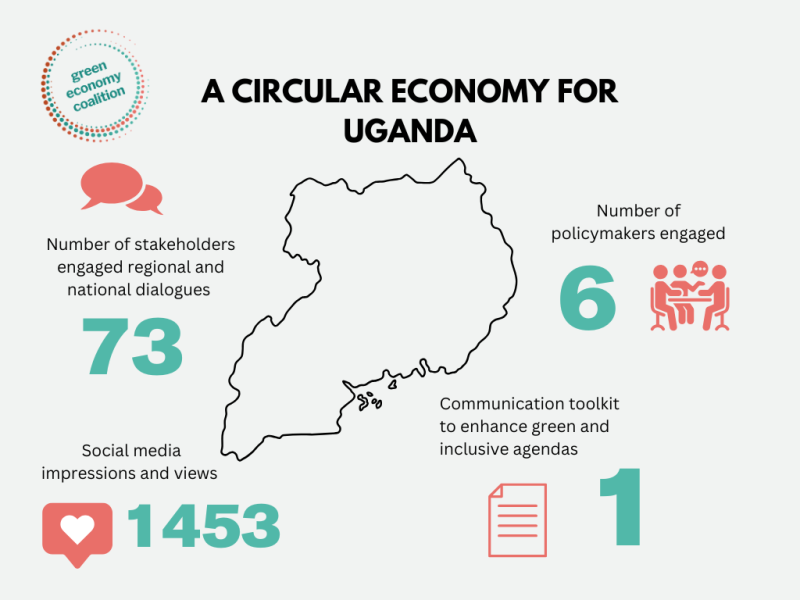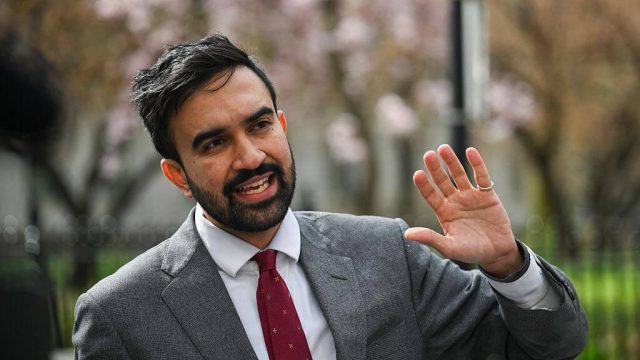Equipped with a toolkit: a circular economy for Uganda
GEC members, ACODE, circulated knowledge on the concept of 'circular economy' in Uganda, influencing policy through compelling narratives

In collaboration with our partners Development Alternatives (DA) in India, Libélula in Peru and ACODE in Uganda, in 2024 the Green Economy Coalition delved deep into audience and narrative research to support the transition to a just, green and circular economy. Over 8 months, the three local hubs brought together separate stakeholder coalitions to identify critical audiences – all with the aim of promoting inclusive green economies.
A circular economy is a regenerative model that minimises environmental impact by maximising resource use. It treats products, materials, and waste as valuable resources to preserve. In Uganda, the transition to a green and circular economy is vital. It has the potential to address unemployment, reduce poverty and improve livelihoods for this and future generations. Through this programme, ACODE has influenced policymakers to enable Ugandan enterprises to operate circular business models. The toolkit produced by ACODE comprehensively equips users with knowledge sources promoting the importance of circular economies.
National and regional stakeholders identified audiences who could influence enterprises in Uganda to operate circular business models. Knowledge around the meaning of circularity is lacking and the concept is poorly understood by policymakers, enterprises and financial service providers. Only 27% of stakeholders were familiar with the term, indicating a significant knowledge gap. Despite this, inclusive green growth agenda and circular economy considerations heavily feature in Uganda’s Third National Development Plan (NDPIV). ACODE developed a toolkit to effectively communicate Uganda’s transition to a circular economy, raising public awareness and influencing policy reform through compelling narratives and inclusive stakeholder engagement. The toolkit also offers localised "opportunity flashcards" for quick reference in developing impactful messaging.
Big effort, big impact for the community
A large part of ACODE’s previous work has been to promote awareness of green approaches to encourage sustainable utilisation of the River Rwizi in the district if Mbarara in Uganda. The advocacy tools have enhanced the ability of Mbarara members who are part of the Green Economy Enterprise Association to target policy makers and to advocate for a change in attitudes towards circular economy practices. One beneficiary of this work has written about how her community has benefited from her innovative recycling initiative: Taking Charge: How ‘Waste Watch Initiatives’ Empowers Communities Through Women-Led Recycling — SHE Changes Climate. Another beneficiary, Mr Isa Kamuhangire, is the founder of a forward-thinking social enterprise tackling the housing deficit and climate crisis in Uganda. He was able to showcase and expand his green enterprise on climate smart housing solutions through an event aimed at promoting sustainable entrepreneurship in African countries.

This work has been influential with policymakers. The Executive Director of the National Environment Management Authority committed to ensuring the implementation of the circular economy principles as set out in Uganda’s National Environment Act, and the National Development Plan IV. Furthermore, research flowing from this work is being used to inform issues around the circular economy in Uganda by stakeholders in the advocacy space. Outreach opportunities on major platforms helped to raise the profile and scale up this work. Media articles were published in Uganda’s popular daily newspapers, podcasts were well received and there were messages on the radio promoting circular economy. This widened reach and provided a platform for the exchange of ideas and knowledge between communities on how best to deal with waste across the country.
“ This podcast significantly enhanced my understanding of the circular economy by effectively illustrating its core principles and real-world applications within the Ugandan context … the NEMA Executive Director, who shared his experience of recycling banana peels in his home backyard garden, showcased the practical application of circular economy principles in everyday life”
Lessons not to go to 'waste'
The team reflected that identifying the target audience beforehand helped to create a network of allies with a common mission and challenged the usual approach of prioritising policy makers’ agendas. Collaboration and a shared voice was important for creating influence and change. However, the timeframe of the project created some restrictions in scope and longevity. Wider audiences could have been reached with more time to target policy makers and diversify stakeholder engagements. This in turn could have enabled ACODE to bring stakeholders, audiences and policy makers together to discuss circular economy issues.
Nonetheless, uptake of the toolkit and messaging has been positive. The initiative has encouraged other organisations to adopt and utilise the approaches from the toolkit, particularly the policy briefing paper for advocacy on circular economy. It has been used to inform research, and a follow up article was written about the project by a major newspaper in Uganda, reaching many thousands of readers. The interventions made a notable impact on the discourse surrounding the circular economy in Uganda and raised awareness and increased knowledge in local communities and government agencies. The issue of waste management has become a popular issue being discussed in various platforms and ACODE will continue to provide technical support and guidance to networks in Mbarara. The communications toolkit can be replicated in other contexts or regions.
- Zaiza Khan, GEC


